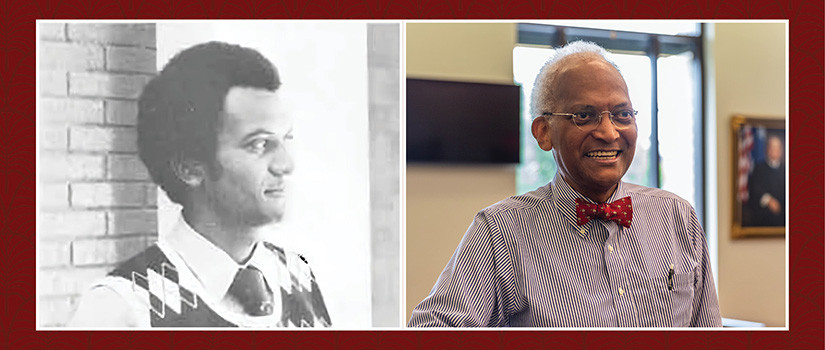Fifty years later, Jim Bowers still remembers the anxiety he felt on his first day at the University of South Carolina Joseph F. Rice School of Law, eager to earn credibility in the eyes of his students. It was a day of firsts for more than him and his students.
“I didn't think about it then but, it was historic,” Bowers says. “I’m the first African American to join the faculty full-time, but I didn't think anything of it then. I was a young man just trying to teach.”
As the first full-time Black professor at the USC Rice School of Law Bowers was primed to set precedents and, at 26 years old, making history was familiar terrain. His hometown is Orangeburg, an epicenter of the civil rights movement in South Carolina, and when he speaks about his experiences protesting or even being arrested as a youth, he is steadfast.
“That was just a part of my legacy, my upbringing.”
Bowers began his college career at Fisk University, a historically Black university in Nashville, Tennessee. But after his freshman year he felt compelled to return to South Carolina to attend the recently desegregated USC to “keep the ball rolling” for other Black students.
At USC, Bowers impressed a number of professors – many who became his champions and, later, friends – and by his senior year he had a time-sensitive scholarship offer from Johns Hopkins University to pursue a master’s in international studies. Although Bowers was gratified, he was determined to enroll at Harvard Law School.
“I basically told Harvard ‘I'd love to come, but you got to give me an early acceptance,’ which was unheard of back then,” Bowers says. “Lo and behold, sometime in November I got a Western Union telegram saying I was accepted.”
He graduated from Harvard with his J.D. in 1970 and began lobbying for the American Bar Association in Washington, D.C. By 1972 he received an invitation to teach a summer program at the USC Rice School of Law.
“The professor who ran the program was Bob Felix and there was also a professor here by the name of Walter Reiser, he taught at Harvard when I was there. They both put the rush on me to get me to come back to South Carolina and teach that summer,” Bowers says. “I said, pretty much as a lark, ‘Well, I never really thought about myself as teaching law, but sure.’”
Bowers was delighted to discover a love of teaching the summer of 1972, and particularly appreciated the opportunity to give back to “Black students who were bright and eager.” When he was invited to join the faculty the following year he accepted.
As a young Black professor, Bowers hoped his presence would help recruit more Black law students. He also hoped it would reassure current Black law students, which is why he was intentional about inviting high-profile Black lawyers to law school events to expose students to success profiles in the law.
Connection and community service are central tenets of Bowers’ ethos, and he takes his role as mentor seriously.
“I kept an open door, and they used it,” Bowers says. “I can still see the names and faces of a lot of Black students finding their way to my door because it was obvious that I was the only one here. And it was obvious that if they needed help or were in trouble, that that's the place to go.”
It was an enjoyable first year albeit a lonely one, so Bowers took a brief sabbatical to write, at the time, cutting-edge research on electronic fund transfers. He returned to teaching at the USC Rice School of Law, but not for long.
“When I went into law teaching in 1973, I was teaching from a purely academic standpoint,” Bowers says. “I often felt that if I'm going to be an effective teacher, I got to learn how to practice law so I can teach my students how to practice law.”
So, Bowers wrote Roderick Hill – a friend and former professor of his from Harvard who had recently been appointed Chairman of the Securities and Exchange Commission – that he wanted to “find [his] way back into the law practice.” Hill responded by offering him a job in the Office of the General Counsel at the White House. After that, “one thing led to the next to the next to the next.”
Next included an in-house position at Aetna Life and Casualty where he stayed for 25 years, ultimately becoming vice president of corporate compliance. He has also served as senior counsel at Day Pitney LLP and as special counsel at the Securities and Exchange Commission. Bowers even taught at several other universities, including Yale Law School, the University of Connecticut School of Law, and Boston University School of Law.
Bowers’ career has many highs, and he has received numerous commendations, but he says teaching at USC remains the most rewarding part of his long career for two reasons.
“Number one, it was the first time that I truly did something that I was committed to and that I thought had much wider social ramifications than the other jobs that I took later on. The second thing – and I appreciate this in hindsight – teaching law, you can see the progression of a student who can now carry the ball on his or her own. You feel an accomplishment that you don't get in law practice,” Bowers says. “While it may seem odd because it was a career that I had at the very beginning of my legal life, it was the most meaningful. And I carry that to this day.”
